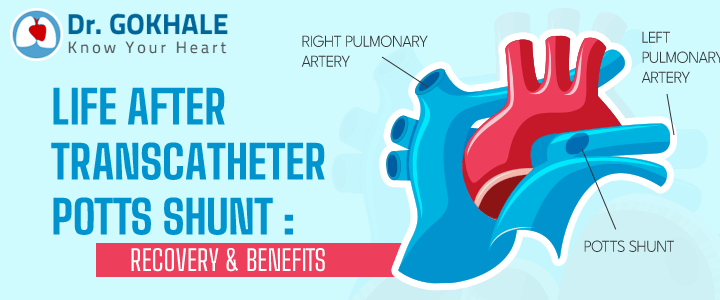Life After Transcatheter Potts Shunt: Recovery and Benefits
Battling severe pulmonary arterial hypertension is serious, and as technology advances, the transcatheter potts shunt has become very important. This innovative procedure helps create a direct pathway between the left pulmonary artery and the descending aorta.
It reduces pressure on the heart and improves oxygen levels in the body. This article discusses the recovery journey of heart transplantation surgery in Hyderabad and the incredible benefits of the procedure.
What is Transcatheter Potts Shunt?
The transcatheter potts shunt is to address severe pulmonary arterial hypertension. In this condition, the arteries in the lungs get restricted, which makes the heart pump harder to circulate blood. Over time, this pressure on the heart can lead to heart failure or the need for more drastic interventions, like heart transplantation in India.
The pott shunt acts as a bypass; it relieves the pressure on the heart and lungs. Also, unlike more invasive surgeries, it is performed using a catheter, which makes it less risky, and it is more accessible for patients who might not be completely fit for the traditional surgical options.
Recovery After the Transcatheter Potts Shunt
The recovery phase is always a very crucial stage, and how it is managed determines and sets the foundation for a healthy, active life.
- Immediate recovery
Patients are monitored closely in the hospital to make sure that there are no complications, like bleeding, infection, or any issues with the shunt placement. Usually, a patient stays between 2 days to 1 week after surgery for observation.
- Transition to home care
Once discharged, your recovery will continue at home. Most people often experience improved breathing and less fatigue in a matter of weeks. Do well to use the prescribed medication because it will help manage blood pressure and prevent blood clots.
- The Diet
Another important aspect is diet. Food plays a very key role in ensuring that you are up on your feet as quickly as possible. You should have a balanced meal. Food rich in antioxidants, lean protein, and heart-healthy fats will expedite recovery. Also, salt and processed foods should be limited to prevent fluid retention.
- Follow-up care
Regular check-ups with your cardiologist are also important. You should check in occasionally to ensure that the shunt placement is still intact. Moreover, you mustn’t stress yourself while undergoing full recovery.
The Benefits of the Procedure
The benefits of the transcatheter potts shunt are beyond physical improvement as it offers patients a new chance at a healthier life.
- Enhance the Quality of Life
One of the most important changes patients experience is relief from symptoms like shortness of breath, dizziness, and fatigue. The procedure improves oxygen delivery throughout the body and enables individuals to engage in daily activities that were once a current task. You can walk up a flight of stairs or stroll without feeling dizzy in seconds.
- Long-term health advantage
In reducing the strain on the heart and lungs, the pott shunt helps to prevent further complications like heart failure. This delays and limits the need for more invasive options like heart transplantation surgery in Hyderabad. A procedure that is often one of last resort.
- Psychological well-being
Patients frequently report that they feel more hopeful and positive about the future. It is a way of giving them independence after living with such symptoms and it has a positive impact on their mental health.
Conclusion
The transplant of pott shunts is not only a medical procedure, it is another chance at life. From the early days of recovery to long-term benefits, patients will undergo the procedure described as transformational. Challenges may exist but with the support of dedicated professionals and adhering to post-operative care, it makes the entire process easy.
If you or someone you know is considering this procedure or in need of a heart transplant surgeon in Hyderabad, take the first step towards recovery by connecting with Dr. Gokhale today.
 Ask Doctor
Ask Doctor
